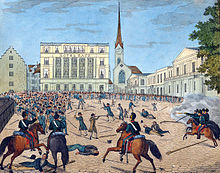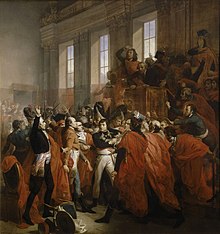Coup d'état
![]()
The title of this article is ambiguous. For other meanings, see Putsch (disambiguation).
A coup d'état (often French coup d'état [ˌkudeˈta]) is a usually violent and surprising action by members of the military or paramilitary organizations and/or a group of politicians with the aim of overthrowing the government and taking power in the state. A coup is often followed by a military dictatorship or the rule of an authoritarian regime.
Antonym is revolution, where regime change comes not from a small group but from relevant sections of the people and results in more profound change.
The word coup is mostly used only for a successful coup, a failed coup is usually called a coup attempt or revolt. A failed coup is often followed by a charge of treason. The word coup has at the same time negative connotations; coup plotters therefore usually use euphemistic terms for their actions.
A coup d'état from above refers to the situation in which military personnel do not act as leaders, but rather heads of state or presidents who were originally democratically elected to office undermine their country's institutions. For example, the 2017 ousting of Venezuela's National Assembly by President Maduro has been called a coup d'état from above, as has the 2015 Polish constitutional crisis and judicial reform.

Representation of the Züriputsch (1839), through which the word putsch became internationally known.
Term Origin
Originally, the term comes from Switzerland, where the Swiss German dialect word Putsch actually means 'push', 'collision'. As early as the 16th century it was also used in a figurative military sense for a sudden advance, a crash against an obstacle or the initiative for an enterprise, and then also acquired the more specific meaning 'popular uprising', 'revolt'. In the 19th century the term was then used for various upheavals and riots such as the Freiämter Putsch (1830), the Züriputsch (1839), the Neuchâtel Putsch (1856) and the Ticino Putsch (1890). Towards the middle of the 19th century, the word then spread throughout the German-speaking world, promoted in particular by newspaper reports of the reactionary Züriputsch in Zurich (1839).
After the First World War, the term was also borrowed into English and French, although here it was initially only encountered as a terminus technicus in connection with the political turmoil of the interwar period in Germany and Austria (Kapp Putsch 1920, Hitler Putsch 1923, July Putsch 1934), in the more general meaning of "attempted coup [no matter where]" only since about 1950. At the latest since the so-called Putsch d'Alger (1958), it has been firmly anchored in French political discourse.
Coup and coup d'état
There is no consensus on whether and to what extent the terms coup and coup d'état differ. The difference is often seen in the fact that in a coup the violent overthrow of the government is attempted from the outside (for example, by the military), while in a coup d'état one or more members of the current government are involved. The term coup d'état is based on the coup d'état of the 18th Brumaire VIII, i.e. Napoleon's seizure of power in France in 1799.
- The dictionary gives the following meaning for putsch: "attempted overthrow by a smaller group [of military officers] in order to take over state power". For coup d'état, on the other hand, the meaning is: "violent overthrow by established holders of high state functions". Coup d'État is treated as (largely) synonymous with coup d'état.
- The Brockhaus adds that a coup d'état is a planned overthrow or attempted overthrow directed against the constitution. Meyers Konversations-Lexikon mentions unconstitutionality as a special characteristic of a coup d'état. A coup d'état, on the other hand, is described less specifically by both, and the characteristic of a planned overthrow directed against the constitution does not necessarily have to be fulfilled.
- The political lexicon also sees the difference in the fact that the actors of a coup d'état are already involved in power. As an antonym to coup d'état, it calls it a putsch.
- According to Walter Theimer's Lexikon der Politik, a coup d'état is carried out "especially by the military or parts of it". The difference is that the putschists are "subaltern groups of officers" or other rather powerless groups; the prerequisite for carrying out a coup d'état, on the other hand, is a high position of power of the actors, who - as in the deposition of Mussolini by King Victor Emmanuel III in 1943 - may even be heads of state. The antonym of coup d'état is revolution.
- The dictionary of history defines putsch as a special form of coup d'état: it is a "coup d'état from below by a smaller group".
Other authors treat the terms as more or less synonymous:
- The criminologist Wolf Middendorf does not see any significant difference in meaning; at most, putschists often belonged to lower military ranks.
- The lexicon of the University of Leipzig describes both terms as synonymous.
- The historian of Eastern Europe Manfred Hildermeier also uses the two terms synonymously, for example when he refers to the Moscow events of August 1991 sometimes as a "failed coup", sometimes as an "attempted coup".

Representation of Napoleon's seizure of power in 1799
Search within the encyclopedia